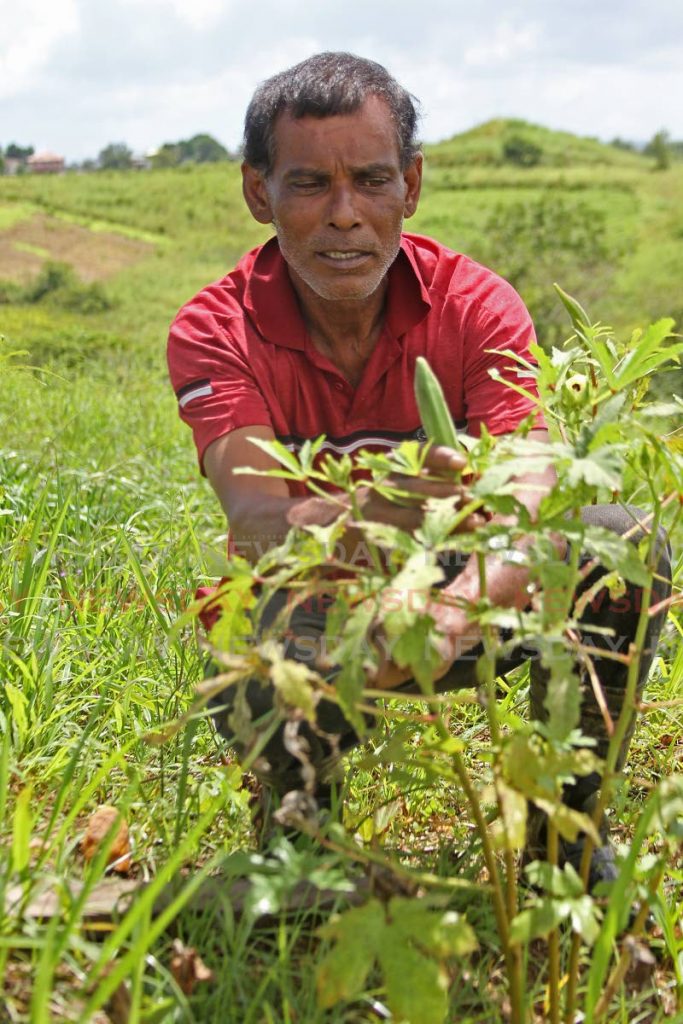'Locusts' wipe out Princes Town farmer's crops

For Princes Town farmer Kamaldeo Ramlogan, this year’s "locust" infestation was so extreme that all his above ground crops like sweet peppers, ochre and corn were destroyed.
With only his root crops like sweet potato barely surviving the infestation, Kamaldeo has been unable to earn an income within the last month and he won’t be able to do so for several more until his newly planted crops are harvested.
Since early October, Princes Town farmers like Kamaldeo have lost thousands of dollars due to an infestation of Moruga grasshoppers.
Victoria county agricultural officer in the Agriculture Ministry, Sati Gangapersad, told Newsday that while these destructive critters are often misidentified as locusts because of their behaviour, they are in fact grasshoppers.
While primarily found in Moruga, Gangapersad said these grasshoppers have recently started encroaching into areas like Debe, Tableland and Princes Town.
She explained, “While it behaves like locusts at times, it’s really the Moruga grasshopper.
“These live in the forests of Moruga but since there have been development in and around the Moruga forests, we at the Ministry believe that their egg beds have continued to move.
“Because they have been displaced, we believe they are now trying to find alternative habits and this is what we are presuming.”
From late September, the grasshoppers enter their adult stage of development and “swarm” outside the forest which is a natural part of their behaviour.
“You will have the young hoppers emerging from January straight down to April.
“Then from April to September, they will be what we called fledglings which is when they start to fly short distances.
“Then from September, straight down to early January, you will find they will be swarming, mating and laying eggs.”
However, Gangapersad is admitting that this year has been the most intense swarming activity they’ve witness to date.
Over the past 30 years, the ministry has been monitoring and dealing with the annual movement of the grasshoppers.
She said, “The ministry has a locust control programme where we follow their lifecycle.
“We do surveillance and tracking to know where the eggs are to spray when the young hoppers emerge.
“Every single year for over 30 years, we at the ministry have been doing what we call ‘targeted spraying’ on the periphery of the forest.
“We also track their fledgling flight and we can still spray at that time. By the time is starts to swarm, there is no earthly reason to spray and it will not make any sense especially given how high they are flying.”
Even though Princes Town farmers called for aerial spraying during this year’s infestation, Gangapersad explained why this wasn’t done as it would have be counterproductive.
“We really empathise with the citizenry but we are not recommending aerial spraying because it causes too much damage to the environment in terms of pollution to waterways and the death of beneficial insects like bees.
“And you need to remember it’s a poison we will be spraying so there will be a risk to people and pets.”
“If farmers want to spray these grasshoppers, especially around residences, we recommend using things like soap water or you can just wait it out because they’ll move.
But while Gangapersad is empathising with the farmers, they are demanding more than empathy.
Kamaldeo told Newsday no representative from the ministry has visited his estate in Fairfield, Princes Town.
He lamented, “It’s a big loss and we got no compensation. When things like this happen, you can see how there can sometimes be an increase in food prices because we does have to raise the price of goods to compensate for our losses because we does get no help.”


Comments
"'Locusts' wipe out Princes Town farmer's crops"